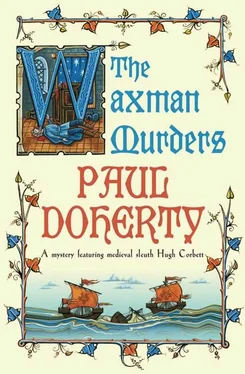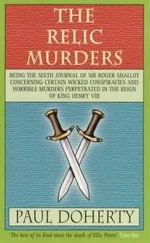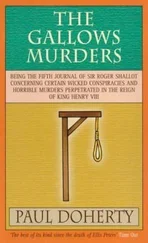Paul Doherty - The Waxman Murders
Здесь есть возможность читать онлайн «Paul Doherty - The Waxman Murders» весь текст электронной книги совершенно бесплатно (целиком полную версию без сокращений). В некоторых случаях можно слушать аудио, скачать через торрент в формате fb2 и присутствует краткое содержание. Год выпуска: 0101, Жанр: Исторический детектив, на английском языке. Описание произведения, (предисловие) а так же отзывы посетителей доступны на портале библиотеки ЛибКат.
- Название:The Waxman Murders
- Автор:
- Жанр:
- Год:0101
- ISBN:нет данных
- Рейтинг книги:3 / 5. Голосов: 1
-
Избранное:Добавить в избранное
- Отзывы:
-
Ваша оценка:
- 60
- 1
- 2
- 3
- 4
- 5
The Waxman Murders: краткое содержание, описание и аннотация
Предлагаем к чтению аннотацию, описание, краткое содержание или предисловие (зависит от того, что написал сам автор книги «The Waxman Murders»). Если вы не нашли необходимую информацию о книге — напишите в комментариях, мы постараемся отыскать её.
The Waxman Murders — читать онлайн бесплатно полную книгу (весь текст) целиком
Ниже представлен текст книги, разбитый по страницам. Система сохранения места последней прочитанной страницы, позволяет с удобством читать онлайн бесплатно книгу «The Waxman Murders», без необходимости каждый раз заново искать на чём Вы остановились. Поставьте закладку, и сможете в любой момент перейти на страницу, на которой закончили чтение.
Интервал:
Закладка:
Apparently Adam had been an industrious worker, and if he’d followed the usual path, he would have finished his apprenticeship, becoming a tradesman and eventually a merchant, a member of the Guild. Instead he had left Canterbury, finding his true calling as a sailor, working in the various ports along the east and south coasts of the kingdom before moving to the more exciting fleshpots in the coastal ports of Hainault, Flanders and Brabant. There he consorted with pirates and privateers, eventually becoming one himself, and securing swift promotion to command a redoubtable pirate cog, The Waxman , a veritable plague on shipping along the Narrow Seas and the wine routes to Bordeaux.
Corbett paused. His own childhood had been warm and loving, but he’d met others, at court and camp, brutalised by barbaric events in their early lives. Was this true of Adam Blackstock? Could he not forget the images he’d seen that hideous night, the screams of his mother, the futile attempts to resist by his father and others? Blackstock had later waged war against English ships, in particular those of Sir Walter Castledene. Was that because the mayor was a prominent merchant of Canterbury, or were there more secret reasons? Corbett had searched the official documents scrupulously, but now he quietly promised himself that he would return to the Guildhall manuscripts and study them more closely.
Hubert the Monk had acted in a similar fashion. Highly intelligent, he might well have graduated to becoming a magister in the schools. He finished his education at St Augustine’s and in the Halls of Cambridge, took the solemn vows of a Benedictine monk, entered the community at Westminster under Abbot Wenlock, then he too had changed, swiftly and abruptly. According to the prior at Westminster, a mysterious visitor had visited Hubert and imparted certain information which had radically changed that young man’s life. He had fled his monastery, renounced his vows and become a venator hominum , tracking down outlaws and wolfsheads, and handing them over to sheriffs, port reeves or town bailiffs in return for a reward. Hubert had certainly kept his distance from Canterbury. Why? Because he hated the city, or was there some other reason? He had plied his bloody trade in the south-eastern shires of the kingdom, keeping himself visored and hooded, a careful enough precaution by a man who did not wish his face to be known to the thieves and villains he pursued along the byways and country lanes of various shires.
Apparently the two brothers had lived separate lives until their paths had crossed, possibly about four years ago. Again it was the city of Canterbury which proved to be the cause and catalyst. Blackstock had intercepted a Hanseatic ship carrying the precious manuscript from Paulents which described in great detail an ancient, very rich treasure buried somewhere in Suffolk. Corbett had heard stories of such buried treasure up and down the kingdom. On one occasion he had even been commissioned by Edward himself to search for the lost hoard of King John allegedly engulfed in the Wash towards the end of that king’s reign. Tales of the Suffolk treasure were common in the folklore of that shire, but Paulents had managed to establish its exact location and hoped to find the treasure along with his business colleague and fellow trader Castledene. However, Blackstock had seized the ship, stolen the manuscript and planned to meet with his brother to discover this ancient precious trove himself. In turn, Castledene and Paulents, with the help of the Crown, had decided to trap Blackstock.
The story of the ambush of The Waxman and Blackstock’s death was familiar now to Corbett, but what of Hubert? Undoubtedly he had sworn revenge and disappeared from the world of men, but where was he now? The Cloister Map had also disappeared. Had Stonecrop stolen it from Blackstock’s cabin? Corbett could imagine a ship preparing for battle. Had Stonecrop used the confusion to take the map, hoping to use it to negotiate with Sir Walter Castledene and Paulents? Instead, with the fury of battle still upon him, Castledene had meted out rough justice and thrown Stonecrop overboard. Had that treacherous lieutenant managed to reach the shore, hide and make his way to Canterbury, that would certainly fit with the tally of dates. Then what? Corbett paused in his writing. ‘Yes, yes,’ he murmured. Sir Rauf Decontet had been a powerful merchant. Evidence that he had secretly subsidised The Waxman was not hard to find. Had Stonecrop arrived in Canterbury to threaten, to blackmail, to wheedle support? Had he brought that precious map? And had Sir Rauf Decontet, a man of few scruples, decided to keep the map and deal with any threats by crushing Stonecrop’s skull in the dead of night and burying his corpse in that lonely, overgrown garden?
Corbett took a sip of water and returned to his writing: Secondo: The Present Time . Hubert the Monk had disappeared. Were he and Servinus one and the same? Had Hubert decided to travel to Germany and negotiate himself into Paulents’ household? It was a possibility. Mercenaries wandered the face of Europe being hired by this merchant or that princely household. Hubert was a highly intelligent man, possibly with a command of languages and knowledge of the world. There was no description of him, so he could travel undetected. Moreover, why should Paulents refuse such an addition to his household, especially when he might live in fear of revenge attacks by Adam Blackstock’s half-brother? Whatever, Hubert the Monk had disappeared, as had the map and Stonecrop. However, Paulents had not given up trying to find that lost treasure. He’d discovered fresh evidence but this time decided to bring it to England himself. He had travelled across Europe, taken ship to Dover and landed there with his wife, his son, their maid and the bodyguard. Paulents and his family had apparently fallen ill, though whether this was due to some contagion or a cruel sea passage could not be established. What was certain was that on the same day they landed at Dover, they received a threatening note, as did Castledene in Canterbury. But how could that have been organised? Corbett paused. If Hubert was hunting both men, it would be possible to arrange through a trader, chapman or tinker for the same message to be delivered to two different individuals in two different towns.
Paulents, undeterred, had travelled on to Canterbury, where he’d been met by Castledene and Desroches, who’d pronounced their sickness caused by the hardships and rigour of their journey. Paulents had then taken up residence at Maubisson with its secure gates and walls, its doors and shutters locked and barred, a ring of guards circling it. Corbett was satisfied from the evidence he’d seen that Wendover had carried out his task faithfully. He closed his eyes for a while and tried to imagine that hideous hall, only this time the fire was burning merrily, candlelight gleaming, Paulents and his family, together with Servinus, relaxing over their evening meal. They would feel comfortable and secure. They were in Canterbury, in a fortified manor house; they had little to fear. Corbett opened his eyes and continued writing. So what had happened that night? How had four able-bodied people been hanged from those iron brackets on the wall? Just left there dangling, strangled, eyes popping, swaying slightly in the jumping shadows? Neither he nor Desroches had found any trace of an opiate or powder, no other mark of violence to their bodies. It was impossible to conclude that all four, at the same time, had decided to take their own lives. Was Servinus responsible? Had he killed them? But how? And how could he have escaped undetected, a foreigner in a snow-bound city? What was the motive behind the murders? Revenge? Or the theft of that secret map?
Читать дальшеИнтервал:
Закладка:
Похожие книги на «The Waxman Murders»
Представляем Вашему вниманию похожие книги на «The Waxman Murders» списком для выбора. Мы отобрали схожую по названию и смыслу литературу в надежде предоставить читателям больше вариантов отыскать новые, интересные, ещё непрочитанные произведения.
Обсуждение, отзывы о книге «The Waxman Murders» и просто собственные мнения читателей. Оставьте ваши комментарии, напишите, что Вы думаете о произведении, его смысле или главных героях. Укажите что конкретно понравилось, а что нет, и почему Вы так считаете.












